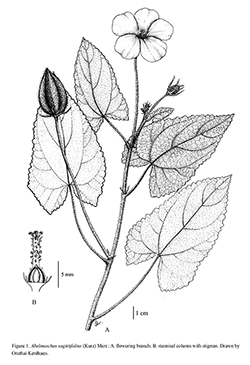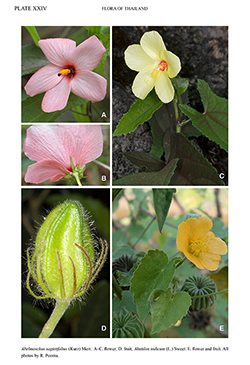e-Flora of Thailand
Volume 14 > Part 2 > Year 2019 > Page 268 > Malvaceae > Abelmoschus
6. Abelmoschus sagittifolius (Kurz) Merr.wfo-0000510919
Lingnaam Agric. Rev. 2: 40. 1924; Lingnan Sci. J. 5: 126. 1927; Y.Tang et al. in C.Y. Wu et al., Fl. China 12: 285. 2007.— Hibiscus sagittifolius Kurz, J. Asiat. Soc. Bengal, 2:46. 1871. Fig. 1. Plate XXIV: A–D.
Accepted Name : This is currently accepted.
Synonyms & Citations :
Description : Perennial herb 0.4–1 m tall; with tuberous root; stem, branches, petiole and peduncle covered with long patent stiff hairs. Leaves variable in shape and size, lower leaves ovate, middle to upper leaves ovate-hastate, sagittate or palmately shallowly to deeply 3–5-lobed, lobes broadly ovate or broadly lanceolate, 3–10 cm long, apex obtuse or acute, base sagittate, hastate or cordate, margin serrate-dentate rarely crenate, sparsely appressed hairy on both surfaces. Petiole 4–8 cm long. Stipules filiform 6–10 mm long. Flower axillary, solitary, 4–5 cm in diam. Peduncle 3–8 cm long, hairy. Epicalyx lobes 6–12, linear or filiform ca 15 by 1–1.5 mm. Calyx 7–20 mm long, hairy. Corolla variable from white, pale yellow, pink or red. Petals obovate-oblong, 3–4 cm long. Staminal column 1.3–2.5 cm long, glabrous. Stylar branches ca 3 mm long; stigmas discoid. Capsule more or less obliquely ovoid or ellipsoid, 2–4 by 2 cm, stiff hairy, shortly beaked. Seeds reniform, glandular striate.
Thailand : NORTHERN: Mae Hong Son (Khun Yuam), Chiang Mai (Mae Sariang), Lamphun (Khun Tan), Tak (Um Phang), Phitsanulok (Thung Salaeng Luang); NORTH-EASTERN: Phetchabun (Nam Nao); EASTERN: Chaiyaphum (Thung Kamang); SOUTH-EASTERN: Chon Buri (Khao Khiao).
Distribution : S China, Cambodia, Laos, Vietnam, Malesia, the Philippines, New Guinea, Queensland.
Ecology : In dipterocarp pine forests, dry evergreen forests, 400–700 m alt. Flowering: April–September; fruiting: June–December.
Vernacular : Khao tom lek (ข้าวต้มเล็ก)(Nakhon Sawan); chi cho (จีจ้อ), maha ka daeng (มหาก่าแดง), som chaba (โสมชบา)(Bangkok); ngao maha kan (เหง้ามหากาฬ)(Phetchabun).
Uses: Tubers medicinally used for stomach ache, neuro tonic. Cultivated as an ornamental.


